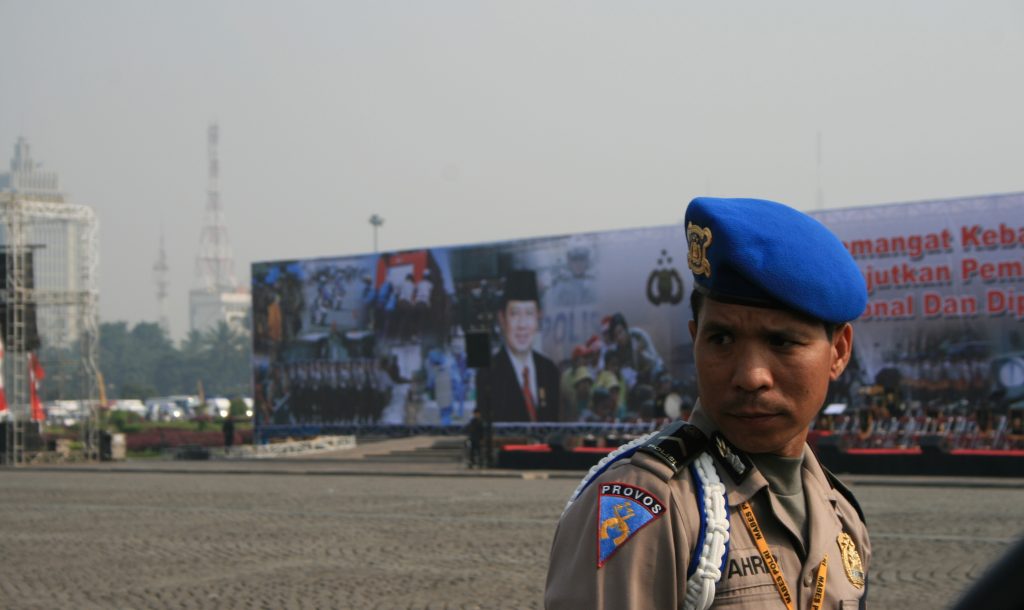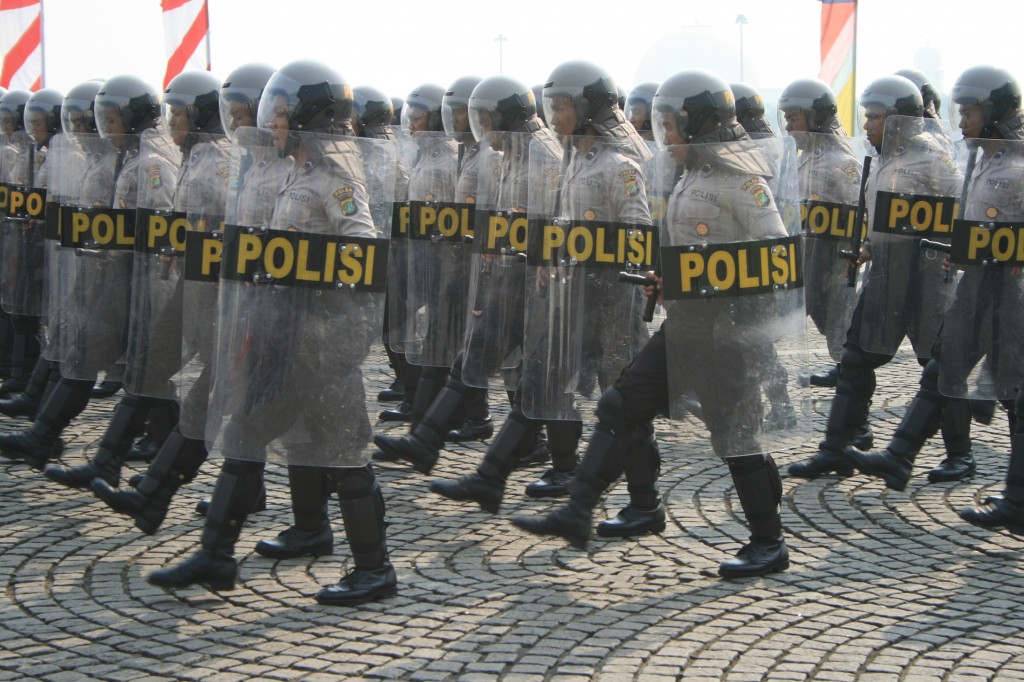
Having successfully manoeuvred past substantive reform, Polri are one of the victors of democratisation. Photo Credit: Jacqui Baker
Three institutions take centre stage this week: the national election commission [KPU], the elections supervisory body [Bawaslu] and the national police [Polri] as the July 9th votes are recapitulated. Vote counting follows a tiered process: polling committees start at the village level, go up to the subdistrict level, district and province before being sent to the KPU. The votes sit at each administrative tier for 2-3 days before being moved up for the next count.
Like the military, the police have no right to vote. Their role in the voting process is to watch over the election officials as this tallying process takes place and escort election officials along with the votes and the all important C1 forms.
254,000 officers will be stationed at polling booths around the country to ensure the validity of the count. Much has been written about the electoral official and their vulnerability to influence, but what about Polri? How neutral are they really? And does this open up the potential for fraud in the counting process?
Polri rightfully have a woeful reputation in the eyes of the public. Every year TII’s corruption perception index sees the national parliament and the police top the charts for the most corrupt state institution. Last year, TII (with some pretty dodgy methodology) said Polri was the most corrupt institution in ASEAN. Add to that, Polri’s ongoing human rights violations, the suspiciously “fat” bank accounts of its generals, its political skirmishes with the KPK, plus its physical ones with the military, and it’s not hard to see why police legitimacy is threadbare.
If Polri are one of the most unruly institutions in Indonesia’s new democracy, they are also one of the most powerful. After their separation from the military in 1999, the police’s authority over security [keamanan] and law enforcement was reinforced and they were placed directly under the president. The idea was to put them in a kind of bureaucratic limbo after 32 years under the ABRI thumb before moving the police under ministerial supervision.
However president Abdurrachman Wahid chose to keep Polri close to hand for coercive leverage in his 2000 face off with the military. Under a Megawati administration, where security sector reform slowed, police politicking and lack of public scrutiny saw radical ideas for a new Polri, like structural decentralisation and an independent public complaints board aborted once and for all. Instead, UU02/2002 created a fiercely centralised Polri, partly overseen by a new National Police Commission [Kompolnas] and Parliamentary Commission III. Most importantly, the direct and irregular relationship between Polri and the president was solidified in law.
The president selects the national police chief and the members of the national police commission, subject to DPR approval. In reality, SBY always get his man. The last two national police chiefs, the hapless Timor Pradopo and current national police chief General Sutarman, have been presidential choices forced through to spite political party rivals at the nth hour.
With a few exceptions, the president has also picked weak candidates to front Kompolnas. The influence of the commission, never strong, has noticeably eroded in the second term of the SBY presidency.
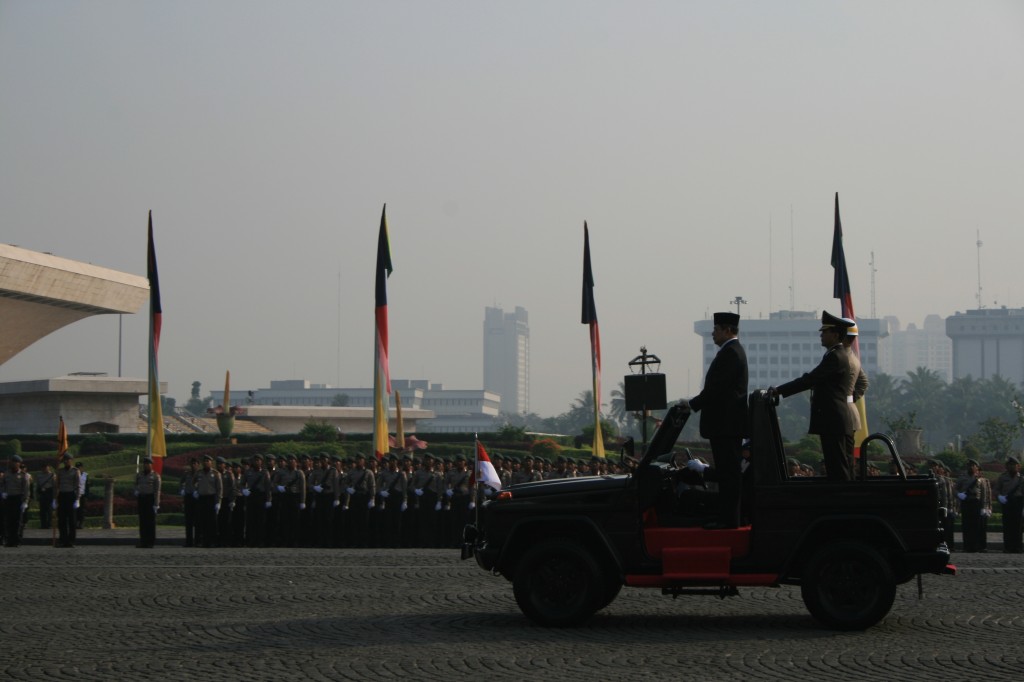
SBY inspects the police troops on Hari Bhayangkara, the anniversary of Polri.Photo Credit: Jacqui Baker
Why would a president publicly committed to reform undermine police professionalism in this way? Above and beyond their powers of legitimate coercion, the police control one of the most important weapons in a new democracy: law. In a political landscape shaped by corruption and political accommodation, this has made Polri, as one general told me, the ‘pretty girl [gadis cantik] of politics’. Who controls the police, controls the ability to define criminality in the sub-legal world of Indonesian politics.
The presidential influence over the police doesn’t mean Polri doesn’t have its own personal preferences. If there was one prior to May 2014, it was probably for a Jokowi presidency. Few amongst today’s police would remember how Fadli Zon and the Prabowo camp fingered Polri for the Trisakti shootings and the 1998 riots (min. 18 if you’re interested).
But most of Polri’s officers feel keenly the day to day struggle to maintain their authority over security [keamanan] in the face of a military that has successfully preserved its territorial apparatus from necessary democratic reform. A Prabowo government signaled a return to everyday security and governance issues for the military.
Gerindra’s own manifesto reads like something straight out of a New Order textbook, using old-school ABRI acronyms to argue that “defence” [pertahanan] and “security” [keamanan] are inseparable from each other. In fact, insists Gerindra, “defence actions create security” . It’s lines like this that give Indonesia’s brown shirts the old regime heebie-jeebies.
That the military split over the Prabowo candidacy would have given Polri no ease. Polri would have surmised that in Prabowo’s horse-trading to win the green generals over, Polri’s cherished security spoils like counter-terrorism and “national security” might be have been up for grabs.
There are also other considerations: Jokowi’s fresh-faced civilian status would have signaled business as usual for the cops. As he headed for the presidential candidacy, Jokowi made no great efforts to plumb the institutions depths. Indeed, as the campaign progressed, Jokowi’s most obvious police champions like former Kapolri Dai Bachtiar and curiously resilient two star serving General Budi Gunawan were just hand-me-down contacts from Megawati. Without any real leverage of his own, under a Jokowi presidency, Polri could get away with some simple reformist posturing without seriously threatening the status quo.
As the campaign progressed, Prabowo made open attempts to court the police vote. Flanked by former Deputy Police Chief turned PKS parliamentarian, Adang Dorajatun, he not only promised to increase police welfare but to make the institution slender, handsome and fearsome, rather than mocked. It was funny on the day, but his comments cleverly went straight to the heart of Polri’s post-authoritarian anxieties.
Across the country, retired police associations and family groups increasingly declared their support for Prabowo. Meanwhile, Jokowi’s campaign was not only disorganised, but willfully dismissed the traditional campaign approach of wooing local power bases. For retired and family police associations awaiting their courting, Jokowi’s failure to connect would have been felt keenly as arrogance.
But as the polls started to narrow, it was SBY’s repositioning to the Prabowo camp that had the most serious consequences for police neutrality. One revealing test for the political winds at Mabes Polri was the tabloid Obor Rakyat, which distributed its first edition in late May 2014. The tabloid’s main function was to smear Jokowi in the pesantren heartlands, principally in Central and East Java, but copies were also delivered to PKB’s far flung pockets in South Kalimantan and Pontianak. With articles accusing Jokowi of being Christian and Singaporean Chinese, Obor Rakyat was the apotheosis of Prabowo’s black campaign, eliciting widespread public condemnation, and complaints by PDIP, Jokowi as well as the national press council and the alliance of Indonesian journalists (AJI).
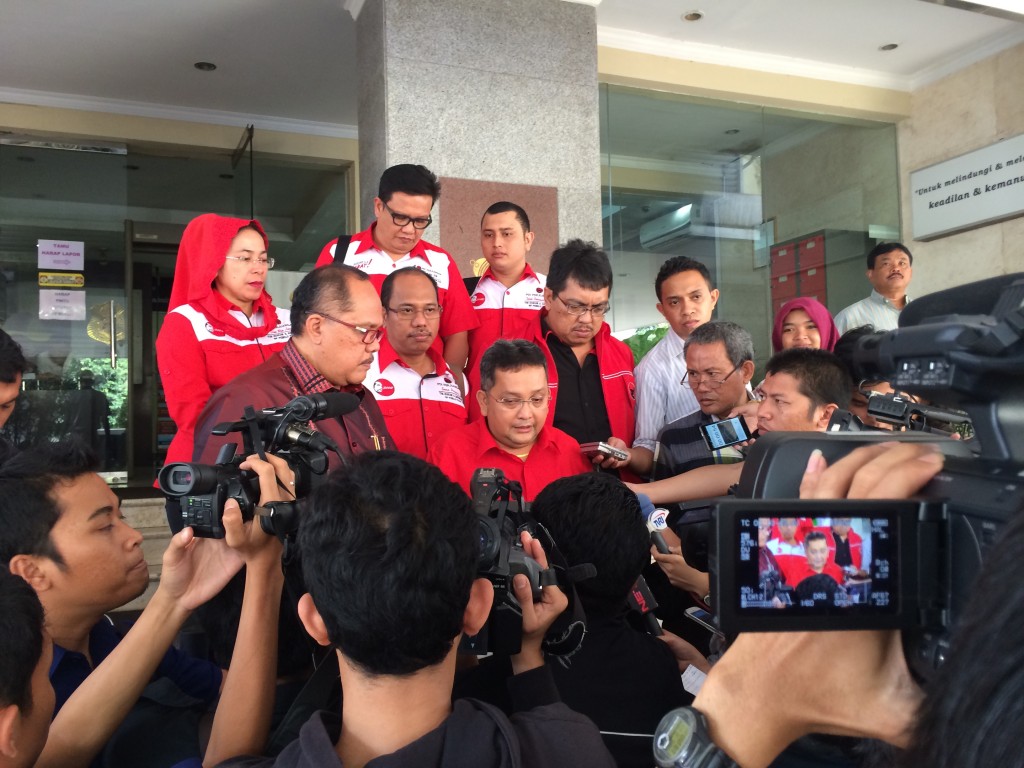
On June 21st, PDI-P parliamentarian Trimedia Panjaitan lodged a criminal complaint with the Department for Criminal Investigations about the anti-Jokowi smear campaigns, including Obor Rakyat. Photo Credit: Jacqui Baker
Throughout the storm, National Police Chief Sutarman and his right hand man, head of Criminal Investigations three star general Suhardi Alius [Kabareskrim] looked unruffled as they alternatively blamed Bawaslu for failing to act and credited the diligence and detail of their criminal investigations for their own delay. The two generals shuffled the issue around in high bureaucratese: Jokowi himself had to make the complaint, not PDI-P. It was beyond the police to interfere with a media and so on.
That an unregistered tabloid with a fake address could make vulgar attacks on a presidential candidate for the period of the campaign was inexplicable until in mid June it was revealed that the Obor Rakyat chief editor was linked to the presidential palace. Although ostensibly “on leave” since April, Setiyardi Budiono held positions as a commissioner on the state owned PT Perkebunan Nusantara VIII and as an assistant to Velix Wanggai, the presidential expert on regional autonomy. SBY made strong statements distancing himself from Obor Rakyat, but tellingly Budiono was neither dismissed or disciplined. Indeed, the Demokrat party assigned one of their own officials to give Budiono legal advice.
Meanwhile the Demokrats came out plumping for Prabowo and despite protestations of presidential “neutrality” SBY’s son was spotted at Prabowo rally. In the last days of the campaign SBY sat in front of the press and gave Prabowo a weird, paternal tutorial to Prabowo on leadership.
All the while Obor Rakyat printed and distributed two more editions. In its final issue, the tabloid called for DNA checks to establish whether Jokowi had really fathered his own children. It was only on the second last day of the campaign period, on July 4th, a full two months after Obor Rakyat started printing, that chief editor Budiono and writer Darmawan Sepriyosa were identified as suspects by the police.
Importantly, the police charges continued to ignore expert recommendation by charging the suspects with violations of the press law. This means that Budiono and Sepriyosa will at most face a Rp 100 million fine, and not the real jail time associated with slander [fitnah] and defamation [pencemaran nama baik] in the criminal code and the presidential election law.
A visibly irritated Jokowi griped last week, ‘We need a brave police… It looks like they ignored it. The person who did it just kept on going and going’.
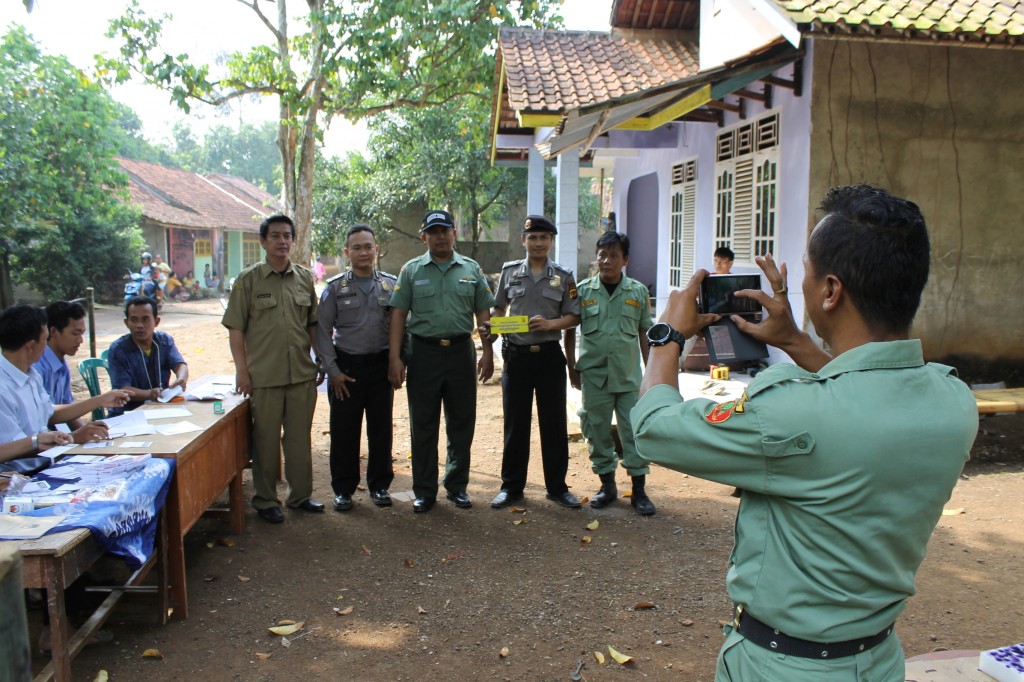
The village secretary (left) tours the polling stations with TNI (centre), police (centre right) and the village security (far right). Photo credit: Jacqui Baker.
As the election day neared and Jokowi experienced a poll bounce, SBY seemed to finally register the depth of political polarisation and the high potential for unrest. SBY does not want to leave his presidency on the back of election violence. His call for the neutrality of the security institutions for the election, after weeks of peddling partisanship, was met with palpable relief from PDI-P quarters.
In the lead up to the big day, election security saw the usual tussle for authority between police and military at HQ. Polri said the military was at their beck and call. TNI Chief Moldoko insisted that the military had to act first, coordinate later. On the day, on the ground, police and military ignored national level rivalries to form joint monitoring teams with local government.
The teams were a natural extension of the district and subdistrict level governing committees that have been running since the New Order, the Muspika and the Muspida. These kinds of organisations are very influential on the police’s political leanings. At the regional level, the police have also swung local elections, such as Ratu Atut’s 2006 gubernatorial election in Banten where a police cooperative printed fraudulent ballots. Such cases of direct intervention are rare, and in keeping with a wider pattern of supporting local elites, rather than forcing through their own political preferences.
If the police are to be swayed to fraud during this vote counting process, it will not be a nationally coordinated campaign. Rather, police partisanship will come from alliances with local political elites. As such, any fraud that takes place will be localised and sporadic.
But with SBY breathing down the collective police necks for neutrality to safeguard his own legacy, an officer would have to be pretty confident of his position to stick his neck out. Although local level politics are a risk for police neutrality in the recapitulation process, cops dependent on showing a good face in Jakarta are unlikely to pervert the vote in seriously coordinated way. At the end of the day, as always, the police will stand by their president.
Jacqui Baker is a Visiting Fellow at the Department for Political and Social Change, ANU. She researches Polri and corruption in Indonesia more broadly. The author is grateful to ISEAS for supporting this research.
 Facebook
Facebook  Twitter
Twitter  Soundcloud
Soundcloud  Youtube
Youtube  Rss
Rss 